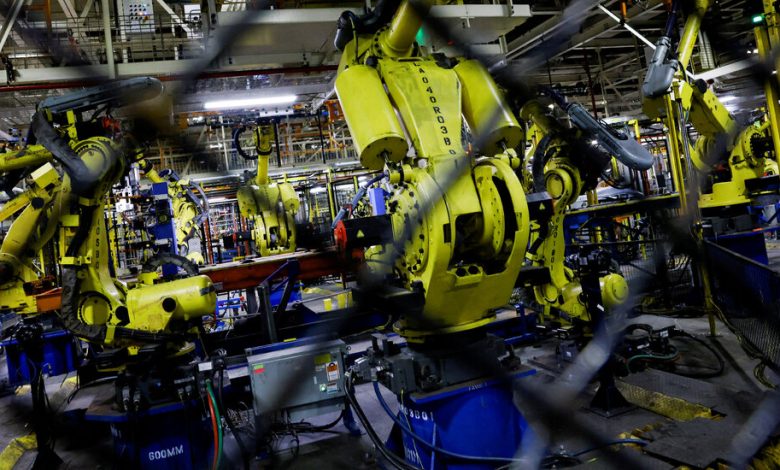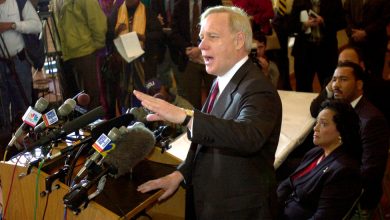Biden and America’s Big Green Push

A year ago, defying predictions that President Biden’s agenda was dead in the water, Congress passed the Inflation Reduction Act. The I.R.A. is sort of the Holy Roman Empire of legislation — as in being neither holy, nor Roman, nor an empire. That is, it isn’t actually about reducing inflation; it’s mainly a climate bill, using tax credits and subsidies to encourage the transition to a low-emission economy.
And it’s a big deal. Along with the CHIPS Act — Creating Helpful Incentives to Produce Semiconductors — the federal government is suddenly engaged in large-scale industrial policy, promoting particular sectors as opposed to the economy as a whole.
Incidentally, I wish Congress would pass the ETAA — End Tacky Acronyms Act. But never mind.
Anyway, the new turn to industrial policy has faced a lot of backlash from policy pundits, much of which boils down to, “Oh no, it’s the return of the Atari Democrats!” So it’s important to be clear that that’s not what any of this is about.
Here’s the story: Back in the 1980s, when Japan’s economic growth still inspired both admiration and alarm, some U.S. observers attributed the country’s success to government promotion of key industries. And there were members of Congress who wanted America to promote what they saw as cutting-edge companies, including video game producers.
This faction essentially vanished when Japan went from role model to cautionary tale (although Japan has done better than most people realize), and Atari itself saw its business implode.
But now I’m seeing critics of Biden’s policy roll out many of the same arguments that a number of economists, myself included, made against industrial policy in the 1980s: Governments can’t pick winners. Positive spillovers from industrial promotion are hard to identify. Any policy favoring particular sectors can be captured by special interests. So industrial policy is very likely to reduce, not increase, economic growth.
Oh, and the Buy American provisions in Biden’s industrial policy may hurt world trade.
As I’ve written before, applying these critiques to Biden’s policy seems, sometimes willfully, to miss the point of what’s going on. The policy isn’t about picking winners and trying to accelerate growth. It’s about addressing threats that aren’t counted in conventional measures of the economy: The threat of climate change, the strategic risks created by an erratic, autocratic China.
Why address these threats with subsidies rather than, say, a tax on greenhouse gas emissions? Political reality. Carbon taxes simply weren’t going to pass Congress; the I.R.A. did, by the narrowest of margins. And the influence of industries likely to receive subsidies was a feature, not a bug. It was, in fact, the only thing that made action possible.
This political logic is still the main justification for the turn to industrial policy. But a year in, it’s becoming apparent that there’s an additional positive effect of Biden’s policy that I don’t think was widely anticipated.
For the new industrial policy has already generated a huge wave of private investment in manufacturing, even though very little federal money has gone out the door so far. Why?
A new blog post from Heather Boushey of the Council of Economic Advisers argues that Biden’s industrial policy helps solve what she calls the “chicken and egg problem,” in which private-sector actors are reluctant to invest unless they’re sure that others will make necessary complementary investments.
The easiest example is electric vehicles: Consumers won’t buy E.V.s unless they believe that there will be enough charging stations, and companies won’t install enough charging stations unless they believe that there will be enough E.V.s. But similar coordination issues arise in many other areas, for example in the complementarity between battery and vehicle manufacture.
Even before seeing Boushey’s post, I’d been thinking along similar lines. In particular, the ongoing investment surge reminded me of a once-popular concept in development economics, that of the Big Push. This was the argument that you needed an active government role in development because companies wouldn’t invest in developing countries unless assured that enough other companies would also invest.
This claim fell out of favor for a long time, partly because at first economists didn’t know how to think about it clearly, partly because once they did they realized that it applied only under limited circumstances. But it was always an idea that made sense under the right conditions, and at this point it looks as if Biden’s industrial policy has, in fact, created such conditions.
I’d still argue that the main justification for America’s turn to industrial policy is political economy: We urgently needed to take action on climate and national security, and that action needed to take a form that would pass Congress, whether or not it was the solution recommended by economics textbooks. But Biden’s policy also seems to be producing a Big Green Push, catalyzing a wave of private investment much bigger than you might have expected from the size of government outlays alone.
The Times is committed to publishing a diversity of letters to the editor. We’d like to hear what you think about this or any of our articles. Here are some tips. And here’s our email: [email protected].
Follow The New York Times Opinion section on Facebook, Twitter (@NYTopinion) and Instagram.



